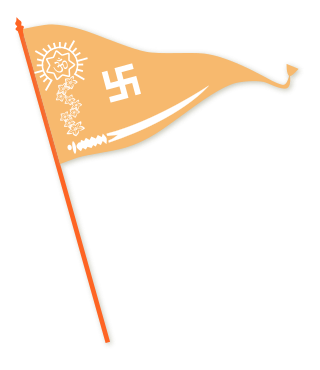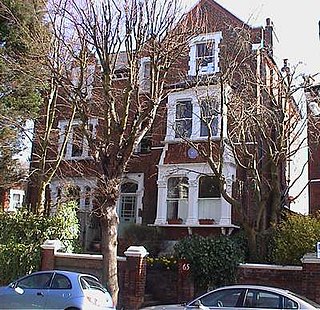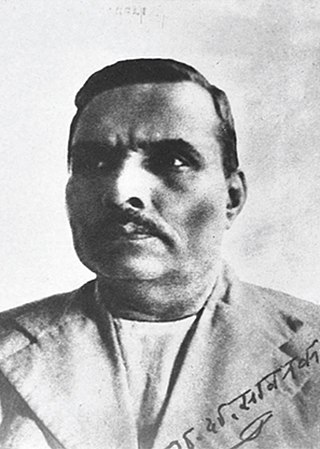Related Research Articles
Hindutva ("Hindu-ness") is the predominant form of Hindu nationalism in India. The term was formulated as a political ideology by Vinayak Damodar Savarkar in 1923. It is used by the Rashtriya Swayamsevak Sangh (RSS), the Vishva Hindu Parishad (VHP), the Bharatiya Janata Party (BJP) and other organisations, collectively called the Sangh Parivar.

Vinayak Damodar Savarkar, Marathi pronunciation: [ʋinaːjək saːʋəɾkəɾ];(28 May 1883 – 26 February 1966), was an Indian politician, activist, and writer. Savarkar developed the Hindu nationalist political ideology of Hindutva while imprisoned at Ratnagiri in 1922. He was a leading figure in the Hindu Mahasabha. He started using the honorific prefix Veer ("brave") since he wrote his autobiography. Savarkar joined the Hindu Mahasabha and popularized the term Hindutva (Hinduness), previously coined by Chandranath Basu, to create a collective "Hindu" identity as an essence of Bharat (India). Savarkar was an atheist.

Keshav Baliram Hedgewar, also known by his moniker Doctorji, was an Indian physician and the founding Sarsanghachalak of the Rashtriya Swayamsevak Sangh (RSS). Hedgewar founded the RSS in Nagpur in 1925, based on the ideology of Hindutva with the intention of creating a Hindu Rashtra.

Ram Naik is a veteran Indian politician from the Bharatiya Janata Party, served as the 19th Governor of Uttar Pradesh.

The Hindu Mahasabha is a Hindu nationalist political party in India.

The Chitpavan Brahmin or Konkanastha Brahmin is a Hindu Maharashtrian Brahmin community inhabiting Konkan, the coastal region of the state of Maharashtra. Initially working as messengers and spies in the late seventeenth century, the community came into prominence during the 18th century when the heirs of Peshwa from the Bhat family of Balaji Vishwanath became the de facto rulers of the Maratha empire. Until the 18th century, the Chitpavans were held in low esteem by the Deshastha, the older established Brahmin community of Karnataka-Maharashtra region.

Madan Lal Dhingra was an Indian revolutionary, pro-independence activist. While studying in England, he assassinated William Hutt Curzon Wyllie, a British official.
The Revolutionary movement for Indian Independence was part of the Indian independence movement comprising the actions of violent underground revolutionary factions. Groups believing in armed revolution against the ruling British fall into this category, as opposed to the generally peaceful civil disobedience movement spearheaded by Mahatma Gandhi.

India House was a student residence that existed between 1905 and 1910 at Cromwell Avenue in Highgate, North London. With the patronage of lawyer Shyamji Krishna Varma, it was opened to promote nationalist views among Indian students in Britain. This institute used to grant scholarships to Indian youths for higher studies in England. The building rapidly became a hub for political activism, one of the most prominent for overseas revolutionary Indian nationalism. "India House" came to informally refer to the nationalist organisations that used the building at various times.

Essentials of Hindutva is an ideological epigraph by Vinayak Damodar Savarkar published in 1923. It was retitled Hindutva: Who Is a Hindu? when reprinted in 1928. Savarkar's epigraph forms part of the canon of works published during British rule that later influenced post-independence contemporary Hindu nationalism.
Balakrishna Shivram Moonje was a leader of the Hindu Mahasabha in India.
The Indian War of Independence is an Indian nationalist history of the 1857 revolt by Vinayak Damodar Savarkar that was first published in 1909.
Abhinav Bharat is a Hindu organization founded by retired Indian Army Major Ramesh Upadhyay in 2006 in Pune, India. It has a large base in Madhya Pradesh. The organization is believed to be the revived form of the pre-Independence era Abhinav Bharat Society. The activities of the organisations received widespread attention after Maharashtra Anti Terrorist Squad (ATS) arrested its member for the 2006 Malegaon bombings case. It has no relationship to the Mumbai-based charitable trust of the same name.
Hindu Revolution is a term in Hindu nationalism referring to a sociopolitical movement aiming to overthrow untouchability and casteism to unified social and political community to create the foundations of a modern nation.
Arthur Mason Tippetts Jackson was a British officer in Indian Civil Services. He was a learned Indologist and a historian. He contributed many papers on Indian history, books on folklore and culture and was popularly known as Pandit Jackson. He was the Magistrate of Nasik when he was murdered by Anant Kanhere and the trial in the case led to the arrest and deportation of Vinayak Damodar Savarkar.
Hindu nationalism has been collectively referred to as the expression of social and political thought, based on the native spiritual and cultural traditions of the Indian subcontinent. "Hindu nationalism" is a translation of हिन्दू राष्ट्रवाद. It is better described as "Hindu polity".

Ganesh Dāmodar Sāvarkar, also called Babarao Savarkar, was an Indian politician, activist, nationalist, and founder of the Abhinav Bharat Society.
Savarkar is a two part biography about Indian politician and writer Vinayak Damodar Savarkar, written by biographer Vikram Sampath and published by Penguin Viking. The first part is sub-titled Echoes from a Forgotten Past, 1883–1924 and the second part is A Contested Legacy, 1924-1966.
References
- ↑ Jayapalan 2001 , p. 21; Bapu 2013 , p. 96
- ↑ Jaffrelot 1996 , p. 26
- ↑ Teltumbde 2005 , p. 212
- ↑ Bapu 2013, pp. 95–96.
- ↑ Sharma 2006, p. 157.
- 1 2 3 Bapu 2013, p. 96.
- ↑ "Nasik Conspiracy Case - 1910". Bombay High Court. Archived from the original on 9 April 2009. Retrieved 3 March 2015.